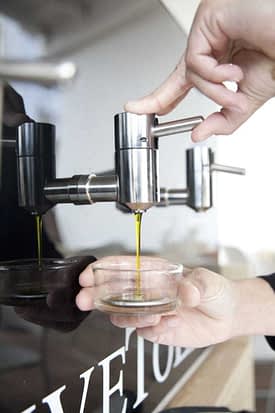Researchers Studying System for Controlled Olive Oil Distribution
With a goal to study the effect of controlled environmental conditions on olive oil chemistry, quality and sensory evaluation, three departments of the University of Florence are conducting multidisciplinary research on a unique track-and-trace program originally developed by OliveToLive founder Paolo Pasquali of Villa Campestri in Florence, Italy.
With €500,000 initial funding from the European Community Organization for Research (ECOR), the TRACS (Tracciabilità di Alimenti Critici per la Salute, translated “Health Critical Food Traceability”) program is studying a unique distribution model for olive oil. The OliveToLive system is designed to maintain ideal conditions from point-of-production through authorized, tracked distribution to final use by containing its exposure to light, oxygen and swings in temperature.
The TRACS project involves three scientific departments from the University of Florence (UF): Industrial Engineering, Agricultural and Internal Medicine. Professor Rinaldo Rinaldi of the UF Industrial Engineering’s Logislab heads a project team including Professor Romeo Bandinelli of UFIE and Professors Maria Luisa Brandi, Annalisa Romani and Annalisa Tanini, all representing the UF Internal Medicine Department. The team is working together to validate the sustainability of EVOO’s best chemical qualities in the controlled OliveToLive environment over time.

Since the OliveToLive system’s creation in 2011, the system has been market-tested at numerous restaurant installations. In addition to Villa Campestri and the Culinary Institute of America in California, OliveToLive has placed equipment in seven locations in Spain and Britain, including four Michelin-starred restaurants: Tickets in Barcelona, Texture in London, Gloria in Oviedo and Monastrell in Alicante, Spain.
“Over the past three years, we have proven the value of the OliveToLive system at every restaurant offering the program to its customers,” said Raquel Perramon, commercial director of OliveToLive Spain. “The guaranteed quality of three different varietals is both educational and a perfect sensory experience of the highest quality extra virgin olive oil. It is exciting that the University of Florence will add scientific validity to our proven market examples,” she added.
Launched in September 2014, the TRACS project is engaged in first phase validation and expects to report initial results by mid-2015 according to research team head, Professor Rinaldi. After first-stage analysis and second-stage engineering, a full working pilot project is expected to begin in mid-2015. Additional proposed phases will be conducted as additional funding is approved by ECOR.









